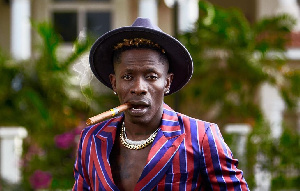His name is a household one in the music and arts industry and essentially in the entire country.
Shatta Wale! He not only identifies himself as a Nima boy but is loved by the people in the community.
How did this become so? A resident of the community who featured on this edition of People & Places took us through history lane to explain how Shatta Wale got associated with the people of Nima.
Abdul Fatahu Alhassan explained that Shatta Wale, at the early stages of his career got the assistance and love of the Nima people after he approached then Nima-based music group ‘VIP’ for a boost.
Read Also: Tutulapato of TV3’s Talented Kidz gains admission to St. John’s Grammar SHS
According to him, his humility earned him the love of the people who eventually hyped him and supported him till he broke through and made it big. “You know Shatta Wale’s first name? Doggy, that’s his first nickname.
Then he changed the ‘Doggy’ to ‘Bandana’, then he changed ‘Bandana’ to ‘Shatta Wale’,” he said.
“When he changed his name to Shatta Wale, he came to Nima and came to live with our boys. He told them; ‘my people, help me, support me, I see the way you support your own; VIP. He went to Prodigal, Promzy and Lazzy and told them to manage him.
“He came and found the love from the Nima people and that love and support carried him along and today he has made his name as Shatta Wale. He humbled himself. You see the way he talks; he doesn’t talk to Nima people like that. He humbled himself so Nima people love him, they hold him and they die for him, now you see where he is,” he added.
Fatahu revealed this whilst touching on the general perception of ‘violence’ usually attached to the people of Nima.
According to him, it is a misconception that has been maintained over time. Contrary to these perceptions, he said the people of Nima really uphold and support individuals who treat them with respect.
“We are not violent; we don’t like disrespect; we don’t like to be undermined. When a Nima person sees that you are trying to undermine them because you see they are coming from Nima, and they know that there’s a perception out there, that when you hear you are from Nima, they start looking down on you, some of them are aggressive for that,” he said.
“So Nima, you give them fire, they’ll give you fire, if you respect them, they’ll respect you,” he added.
Watch the full video of this edition of People & Places here:
 Home Of Ghana News Ghana News, Entertainment And More
Home Of Ghana News Ghana News, Entertainment And More





